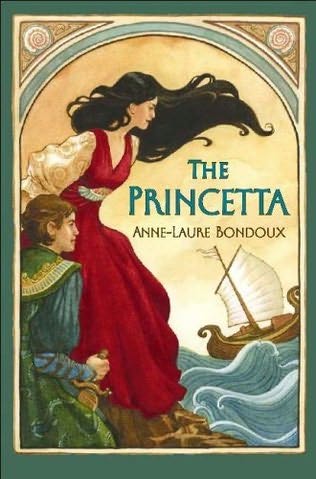Review: The Princetta, by Anne-Laure Bondoux
 |
| I am *in love* with this cover |
Bondoux has managed to make adult emotions and situations playful by creating a whole new world out of the mixed origins of our real world. She’s taken known cultures – American, German, Italian, Spanish, Indian, Japanese and French (for example) and mixed them together, mixed their languages together, to make this new world with its new vocabulary.
Some terms and items retain their meanings (i.e. a harem is still a harem and a sword is still a sword) but others are composites of various languages. For instance, the robes worn inside the harem are called “sarimonos,” an obvious combination of the Indian sari and the Japanese kimono. (Yes, I feel like the dad in My Big Fat Greek Wedding.) . And then there are the slave-guardians of Gai’s harem, the preunuchs, a term which sounds like a mix of “prefect” (at least, by Harry Potter standards of the definition of prefect) and “eunuch.”
Bondoux not only combined languages, but created a tour de force of both cultural and literary pastiche. The structure of the story is basically reminiscent of French and German fairy tales but as the journey continues the palate broadens, dipping into shades of Greek tragedy, biblical parables and even venturing towards LeGuin’s Earthsea in the chapters on the archipelago. Even some of the character names draw on literature and myths—specifically Orpheus (related to the myth of Orpheus and Euridice), Zeph (best associated with Zephyrus who brought Psyche to Cupid’s palace) and—though perhaps the most obscure—Babilas (who is quite large and quite strong, whereas St. Babilas was the patron saint of those with rheumatism and arthritis.)
I imagine the novel was quite a task for translator Anthea Bell to take on. Taking words of mixed origins settled among the regular French text must have been slightly troublesome. However, she managed wonderfully. As beautiful as I’m sure the novel reads in its original French, Ms. Bell has managed to take Bondoux’s work and make English feel like the original. That being said, the real beauty lies in the imaginative world that Bondoux has created—a world where women are sometimes islands, fathers are not always kind, and dreams aren’t always what we’ve wished for.
A side note: this is one of those books that I came across kind of accidentally, and fell in love with. I'm sad that I have to give it back to the library, and I hope to someday own my own hardcover copy...when I can afford it!
Comments
Post a Comment
Any and all feedback is welcome - thanks for taking the time!